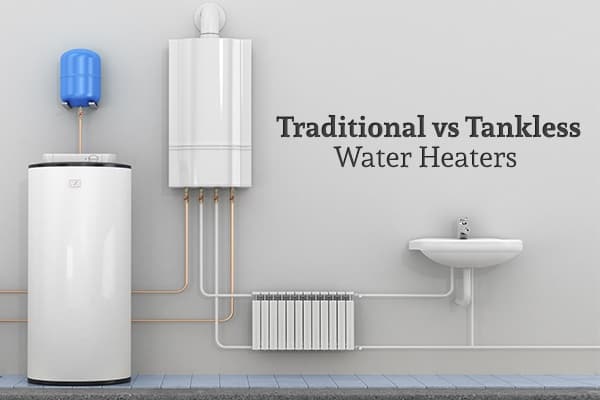
Table of contents
Hopefully, you only have to think about what kind of water heater you want to install occasionally. However, when you do have to think about replacing or installing a new water heater, you want to make sure you make the right choice the first time. Otherwise, the wrong choice could make you feel like you’ve had a bucket of cold water dumped on you—literally and metaphorically.
If you’re already struggling with a less than ideal water heater, it is even more imperative to get the best water heater for you this time around to avoid discomfort, costly repairs, or even yet another replacement. Here’s what you should know about traditional and tankless water heaters.
What Are Traditional Water Heaters?
Traditional water heaters have storage tanks that can hold anywhere from 30-50 gallons. The tank is insulated, designed to heat and store water until it is needed. A pipe runs from the top of the storage tank to different destinations in your house, including the kitchen, bathroom, and other fixtures and appliances that use hot water on your property. Traditional water heaters can run on gas or electricity. Natural gas water heaters use about 50% less energy than electric, but they have a higher initial cost.
What Are Tankless Water Heaters?
Tankless water heaters use high-powered burners to quickly heat water as it runs through the heat exchanger. It then shifts the water through your pipes to its destination. The main difference is that, as the name implies, the water is not held in a tank after being heated. Instead, it is rapidly heated and immediately sent out as needed. These types of water heaters are more energy-efficient and help save on water usage compared to traditional models.
Cost Comparison
Traditional water heaters have a lower initial cost, as well as lower overall repair and maintenance costs due to simple operation design as compared to tankless water heaters. However, they have higher utility costs due to the hot water heater needing energy to heat and reheat the water stored in the tank.
Tankless water heaters have a higher initial cost and higher maintenance and repair costs due to more complex parts of the unit. That said, they do have lower energy and water costs since water is heated on command rather than stored, meaning you only use energy to heat the hot water you actually use. Tankless water heaters save homeowners an average of 24%-34% on energy costs when compared to a traditional water heater.
Lifespan Comparison
Traditional water heaters have a lifespan of about 10-15 years, while tankless water heaters can last anywhere from 20-30 years. Keep in mind that these average lifespans are affected by the level of maintenance.
Other Considerations:
Traditional water heaters occupy a lot of space due to the size of the tank. This can make them difficult to install in smaller homes. Additionally, hot water can run out and there will be some wait time before hot water is available for use again as the tank has to refill and reheat.
In contrast, tankless water heaters do not take up much space which makes them great for smaller homes. On-demand hot water makes it nearly impossible to run out unless there is an issue with the heat exchanger. You may be concerned about how quickly a tankless water heater can heat a certain amount of water, but tankless hot water heaters can deliver two to three gallons of hot water per minute.
Need a New Water Heater?
Like any other big investment, a water heater is important to get right the first time. However, with some information to navigate, it can be difficult to make sure you’re getting what you want and need. Our skilled team of experts at HEB Plumbing & Sprinkler will work with you to make sure you choose the best water heater for you, and we’re happy to help you with all of your other plumbing needs while we’re at. Contact us to schedule a consultation or appointment today!
